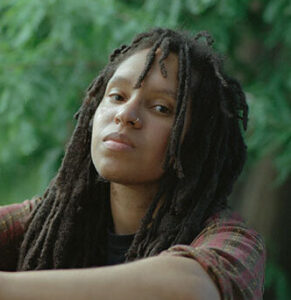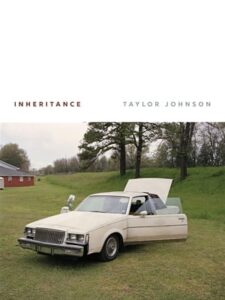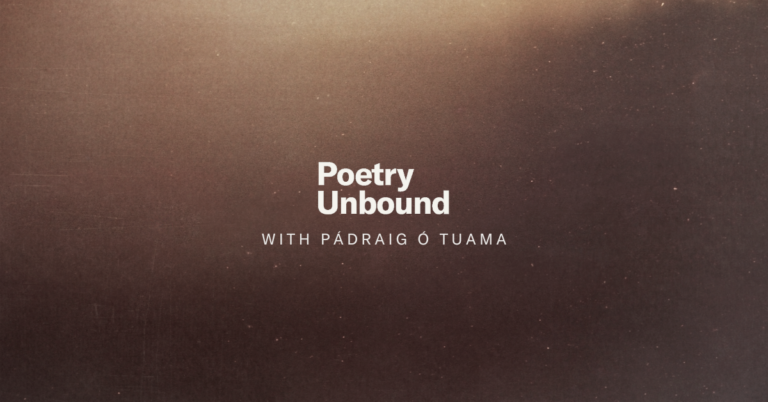Taylor Johnson
Pennsylvania Ave. SE
When you look at people who are younger than you — particularly teenagers — does your mind ever take you back to yourself at their age? Taylor Johnson’s poem “Pennsylvania Ave. SE” performs this feat of time travel, going from a glimpse of two boys on bicycles to a haunting sense memory of what was once so yearned for: to be seen, to be wanted, to be free.
We’re pleased to offer Taylor Johnson’s poem and invite you to subscribe to Pádraig’s weekly Poetry Unbound Substack, read the Poetry Unbound book, or listen to past episodes of the podcast. We also have two books coming out in early 2025 — Kitchen Hymns (new poems from Pádraig) and 44 Poems on Being with Each Other (new essays by Pádraig). You can pre-order them wherever you buy books.
Guest

Taylor Johnson is proud of being from Washington, D.C. He has received fellowships and scholarships from CALLALOO, Cave Canem, Lambda Literary, VONA, Tin House, Vermont Studio Center, Yaddo, Conversation Literary Festival, Bread Loaf Writers’ Conference, and Bread Loaf Environmental Writers' Conference, among others. In 2017, Johnson received the Larry Neal Writers' Award from the D.C. Commission on the Arts and Humanities. His poems appear in The Baffler, Indiana Review, Scalawag, and The Paris Review, among other journals and literary magazines. His first book, Inheritance, was published in November 2020 by Alice James Books.
Transcript
Transcription by Alletta Cooper
Pádraig Ó Tuama: My name is Pádraig Ó Tuama, and sometimes when I’m looking at a poem, I try to make sure to look at it as if it is at least three things. It’s partly coming from the life of the poet. It’s also a work of art, like a painting or a photograph, or a piece of film. And also you get ways within which somehow the dreamscape of the poem is working on me, the reader, as well as maybe the poet themselves, that they are being brought into something that they don’t have complete control over. I like looking at the poem like that because not every poem has to make perfect sense because that’s the whole point. Life can be so strange and so complex, and time can do such peculiar things that often we need something that doesn’t wrap itself up in a neat bow in order to hold the experience that we have that has led to the need for the poem to be written.
[music: “Praise the Rain” by Gautam Srikishan]
“Pennsylvania Ave. SE” by Taylor Johnson
“Bless the boys riding their bikes straight up, at midnight, touching,
if only briefly, holding, hands as they cross the light to Independence.
Bless them for from the side the one on the red bike looks like me,
his redbrown hair loose against the late summer static heat.
The boy who was not me (see how I did that) fixes his mouth to say
something I will never hear I love you or I’m so sad though
more than likely Catch up. Bless the boy who was me on his bike
because he was a witness to my witnessing and did not turn away,
did not make of me a disappeared, burned thing— instead nodded as boys do.
Bless the distance and the knowing there. What my mind makes of these boys,
bless that long hallway I’m always going through.
Bless what could be mine or me.
Bless the boys I wanted to be or wanted.”
[music: “Dust of Summer” by Gautam Srikishan]
So this beautiful poem of reminiscence and tenderness and blessing by Taylor Johnson, it seems to occur halfway between something that’s occurred and then the way that an occurrence bounces the poet into a memory. I find myself imagining that Taylor Johnson had seen some “boys riding their bikes straight up, at midnight, touching” — and this is the opening line of the poem — and saw one of the boys who looked a little bit like Taylor Johnson had looked like when he was younger, and then from that he began to see through these boys into his own memories of being a younger person, what it was that he held with inside himself when he was younger, what it was that he survived, what it was that he coped with, who it was he wished to be and the truth that he knew about himself.
It’s a poem filled with, with yearning; with tenderness too, even from the second line, “touching if only briefly holding hands as they cross the light to Independence.” Presumably, Independence is just the name of an intersection with Pennsylvania Avenue Southeast, but there’s something about the way Independence occurs there in the line that makes me think that it’s not only the name of a road but that it’s also something that any teenager, when they’re younger, would wish for, as well as anybody who’s older can remember wanting. And wanting independence when you’re a young person and then the independence that you have once you’ve progressed into adulthood can be two very different things. And sometimes you can miss the independence that you yearn for because independence, when you get it can sometimes be a much more complicated thing.
[music: “Every Place We’ve Been” by Gautam Srikishan]
This poem is so photographic. It almost appears like a reel of reminiscence. Somehow, even though it’s midnight, I can see everything, maybe by streetlight. There’s the “redbrown hair loose against the late summer static heat.” There’s the bikes. And then also there’s the way within which Taylor Johnson sees the tableau in front of him and then sees all the things that tableau holds, all that yearning. “The boy who is not me” and then he has in brackets “(see how I did that) fixes his mouth to say / something I will never hear.” And then he gives three options. “I love you or I’m so sad” or “more than likely Catch up.” I love the possibilities of seeing these boys in front of him and thinking, What kind of thing would they say? “I love you.” “I’m so sad.” Truths that everybody lives with at some point or another or wants to say. But then much more likely “Catch up.”
At that stage, I feel like the poem begins to move away just from what’s occurring in front of him and begins to narrate the story of his own life, “Bless the boy who is me on his bike / because he was a witness to my witnessing and did not turn away.” And then he goes on and it takes it even deeper. “Did not make of me a disappeared, burned thing.” “A disappeared, burned thing.” I wonder what that means.
I’m never completely sure if a poem should be read solely through the biography of the particular poet. Sometimes a poet adopts a speaker’s voice that might be entirely different to their own, but other times a poet does write poems that are autobiographical or somewhat autobiographical. Taylor Johnson is a trans man and I find myself wondering, is this poem a way of speaking back to a boy self that he knew was his own boy self, but that circumstantially or on a level of confidence or on a level of safety or all of those and more, he wasn’t able to speak about. “Bless the boy who is me on his bike / because he was a witness to my witnessing and did not turn away.” He’s praising the boy that he knew himself to be, even though other people might’ve denied the boy that he was. And then he says, “bless the distance and the knowing there.” “The knowing.” What is it that we know about ourselves? There is a truthfulness that this poem is praising. And also this poem is reflecting on the complexity of what it’s like to have to wait with time and what it is after time to look back, to hold in yourself all that you knew, but that you weren’t able to speak safely.
[music: “The Edge of All There Is” by Gautam Srikishan]
The word “bless” is repeated so many times in this poem. And what is it? What is a blessing? I have all kinds of associations with it culturally, as well as from my own religious background. Typically a blessing is something said in the here and now to pronounce some kind of wish for goodness on an event that’s occurring in the moment. There can be a way within which people bless a body before a body is laid in a grave or cremated. There can be blessings for the taking of a name or the changing of a name. Of course, there’s blessing for ceremonies of marriage as well.
And rather than thinking about blessing as where is it coming from? Is there some divine power being called upon? I think sometimes that is missing the point. A blessing is noticing something small that’s happening in the here and now and trying to give a particular importance and something of the sacred to it. It’s honoring the everyday. Often it’s a moment of transition or bravery or something nascent as well. So “bless the boys riding on their bikes straight up,” “bless them for from the side the one on the red bike looks like me,” “bless the distance and the knowing.” “Bless that long hallway,” “bless what could be mine or me. / Bless the boys I wanted to be or wanted.”
This sense of who will I be, who am I? This sense also of who do I desire? There’s a way within which teenagerhood is so exploding with the tension and the yearning that fantasizes really that it will achieve culmination when you get to the grand age of, I don’t know, 20 or 90. But what often happens then is once we reach adulthood, we look back to those moments of yearning and praise them and see the courage it took to live in that long ache of self that is those strange years of teenagehood.
[music: “Family Tree” by Gautam Srikishan]
“Pennsylvania Ave. SE” by Taylor Johnson
“Bless the boys riding their bikes straight up, at midnight, touching,
if only briefly, holding, hands as they cross the light to Independence.
Bless them for from the side the one on the red bike looks like me,
his redbrown hair loose against the late summer static heat.
The boy who was not me (see how I did that) fixes his mouth to say
something I will never hear I love you or I’m so sad though
more than likely Catch up. Bless the boy who was me on his bike
because he was a witness to my witnessing and did not turn away,
did not make of me a disappeared, burned thing— instead nodded as boys do.
Bless the distance and the knowing there. What my mind makes of these boys,
bless that long hallway I’m always going through.
Bless what could be mine or me.
Bless the boys I wanted to be or wanted.”
[music: “Praise the Rain” by Gautam Srikishan]
Chris Heagle: “Pennsylvania Ave. SE” comes from Taylor Johnson’s book Inheritance. Thank you to Alice James Books and Anamot Press who gave us permission to use Taylor’s poem. Read it on our website at onbeing.org.
[music: “Praise the Rain” by Gautam Srikishan]
Poetry Unbound is: Gautam Srikishan, Eddie Gonzalez, Lucas Johnson, Kayla Edwards, Tiffany Champion, Cameron Musar, and me, Chris Heagle.
Our music is composed and provided by Gautam Srikishan and Blue Dot Sessions.
This podcast is produced by On Being Studios, which is located on Dakota land. Open your world to poetry with us by subscribing to our Substack newsletter. For links and to find out more visit poetryunbound.org.
Books & Music
Recommended Reading
The On Being Project is an affiliate partner of Bookshop.org and Amazon.com. Any earnings we receive through these affiliate partnerships go into directly supporting The On Being Project.







